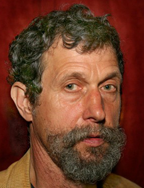 If you’ve been by the Efroymson Center since the arrival of poet D. Nurkse yesterday, you may have noticed a different sound emanating from the house, one far more musical than the typical coffee pot gurgle or the clamor of students in between classes.
If you’ve been by the Efroymson Center since the arrival of poet D. Nurkse yesterday, you may have noticed a different sound emanating from the house, one far more musical than the typical coffee pot gurgle or the clamor of students in between classes.
Since I’ve assumed by current position at Butler, spending most of my hours at the ECCW, I’ve bumped into several of the visiting writers on the job, or at least noticed their presence in the apartment while passing through the kitchen or working downstairs.
Nurkse’s time in the apartment has been impossible to ignore (and I mean this in the best way possible), as he spent his downtime yesterday in the apartment playing the flute. Though perhaps not intended for an audience, it was something easily appreciated, as it was not only an enjoyable listen, but also a sonorous reminder that the esteemed writers who visit are real people with real hobbies.
Nurkse will entertain in a different capacity this evening, reading at the Robertson Hall Johnson Room at 7:30 p.m. as part of the Vivian S. Delbrook Visiting Writers Series.
The Brooklyn-based poet has penned 10 collections of poetry, including A Night in Brooklyn (2012), The Border Kingdom (2008), The Fall (2003), and The Rules of Paradise (2001). Throughout his career, he’s racked up numerous awards and prizes for his work, including the Literature Award from American Academy of Arts and Letters, a Guggenheim poetry fellowship, and two National Endowment for the Arts fellowships.
If the publication and awards don’t grab your attention, like say the sound of a flute would, Nurkse’s craft certainly speaks volumes. It seems appropriate that he has made the most of the lulls in his schedule here at Butler, since he pays great attention to the breaks and pauses in between his words and stanzas. As Nurkse told an interviewer after the release of The Fall, “As a poet you enjoy a line break, which, between stanzas, is like a double check in chess: it comes at you from different sides and has a great deal of resonance, and the hope is to be able to put the narrative elements in those spaces between the stanzas.”
Besides being the smartest thing I’ve heard all day, Nurkse’s insight has enhanced my reading of a poem of his that has remained with me since I received it in a workshop packet from Dana Roeser. “Treasures of the Cove” captures one of the final moments Nurkse spent with his father, who at the time “had a week to live.” Nurkse doesn’t editorialize or insert emotion; he simply describes his surroundings and lets the silence fill in the elegy.
Each pebble glinted
with the sea’s life.
Amazing, my father said,
but he kept his eyes on Drummond Rock.
If I had dared
I would have showed him
my empty hand and let him murmur
how beautiful.
The movement between stanzas is nothing short of stirring. The reader is left sensing the amazement of life, but also the power of what is not seen or enacted–a dying father who can’t help but stare off at the distance, a son who can’t summon the strength to show him an empty hand.
After several short stanzas, the poem ends with a deep breath, a long look at finality.
His strides were colossal.
I ran in his shadow
but gingerly, so the shells
in my pocket wouldn’t shatter:
whelks, spiral staircases
into nothing, mother-of-pearl shards
like broken sunsets, a clamshell
found an hour ago, now dry, gray,
useless except to hear
my own ocean.
Pay attention to what happens when Nurkse pauses in between stanzas and poems tonight. Sometimes the moments away from the focus are the ones that have the most to say.